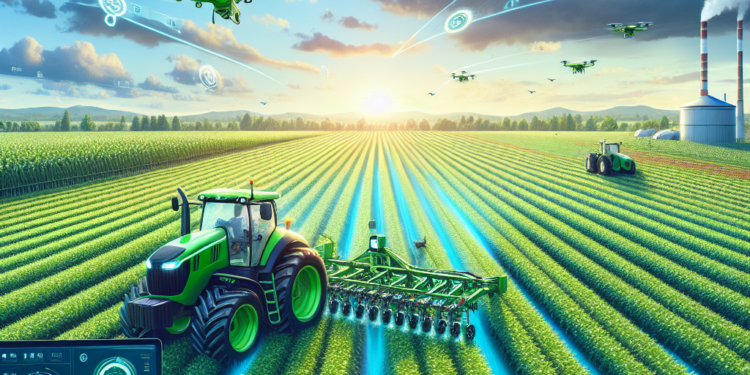Artificial Intelligence (AI) has been making waves in various industries, and agriculture is no exception. With the global population expected to reach 9.7 billion by 2050, there is a pressing need to find innovative solutions to increase food production while minimizing environmental impact. AI in agriculture promises to revolutionize the way crops are grown, harvested, and managed, leading to increased efficiency, productivity, and sustainability.
One of the key challenges in agriculture is the unpredictability of weather conditions and the increasing pressure on natural resources such as water and arable land. AI technologies can help farmers make data-driven decisions to optimize crop production and mitigate risks. By analyzing data from sensors, drones, satellites, and other sources, AI algorithms can provide insights into soil health, crop health, weather patterns, and pest infestations. This enables farmers to adjust irrigation, fertilizer application, and pest control measures accordingly, leading to higher yields and reduced input costs.
Agricultural robots powered by AI are also transforming the way crops are planted, weeded, and harvested. For example, autonomous tractors equipped with computer vision technology can navigate fields and perform tasks such as planting seeds and spraying pesticides with precision and efficiency. Robots can also be used to weed fields, reducing the need for herbicides and manual labor. Harvesting robots equipped with sensors and AI algorithms can pick fruits and vegetables at the optimal ripeness, reducing food waste and increasing the quality of produce.
AI-powered drones are another game-changer in agriculture, providing farmers with real-time aerial imagery of their fields. Drones can identify areas of crop stress, monitor plant growth, and detect pest infestations with high accuracy. This information allows farmers to take timely action to address issues before they escalate, improving crop health and productivity. Drones can also be used to create 3D maps of fields, enabling farmers to make precise decisions about irrigation and fertilization.
In addition to on-farm applications, AI is also revolutionizing the way agricultural supply chains operate. AI-powered algorithms can optimize logistics, warehouse management, and inventory forecasting, leading to streamlined operations and reduced costs. By analyzing historical data and market trends, AI can help farmers and retailers make informed decisions about pricing, product placement, and marketing strategies. This allows for better alignment of supply and demand, reducing food waste and increasing profitability for all stakeholders.
One of the most promising applications of AI in agriculture is in the field of precision agriculture. Precision agriculture involves using data analytics, machine learning, and IoT technologies to monitor and manage individual plants or small areas within a field. This allows farmers to tailor inputs such as water, fertilizer, and pesticides to the specific needs of each plant, optimizing resource utilization and minimizing environmental impact. Precision agriculture can also help farmers adopt sustainable practices such as conservation tillage, cover cropping, and integrated pest management.
Agricultural companies are investing heavily in AI research and development to stay competitive in the rapidly evolving industry. For example, John Deere, a leading manufacturer of agricultural machinery, has been at the forefront of developing AI-powered solutions for precision agriculture. The company’s FarmSight platform integrates data from sensors, satellites, and weather stations to provide farmers with actionable insights for crop management. John Deere’s autonomous tractors and harvesting equipment are equipped with AI algorithms that can perform complex tasks with minimal human intervention.
Another major player in the AI in agriculture space is Monsanto, a biotechnology company that specializes in developing genetically modified seeds and pest control products. Monsanto has been leveraging AI technologies to optimize seed breeding, crop monitoring, and pest management. The company’s Climate FieldView platform provides farmers with a comprehensive set of tools for monitoring and managing their fields, including satellite imagery analysis, weather forecasting, and yield mapping. By combining AI with genetic engineering, Monsanto is able to develop crop varieties that are more resilient to climate change and pests.
In conclusion, AI has the potential to revolutionize the agriculture industry by enabling data-driven decision-making, increasing productivity, and promoting sustainability. Through the use of AI technologies such as machine learning, computer vision, and IoT, farmers can gain valuable insights into soil health, crop health, weather patterns, and pest infestations. AI-powered robots, drones, and sensors are transforming the way crops are grown, harvested, and managed, leading to higher yields and reduced input costs. Precision agriculture is emerging as a key application of AI in agriculture, allowing farmers to optimize resource utilization and minimize environmental impact. Agricultural companies such as John Deere and Monsanto are at the forefront of AI research and development, leveraging AI to develop innovative solutions for precision agriculture. Overall, AI in agriculture holds great promise for sustainable food production and a more efficient supply chain.













